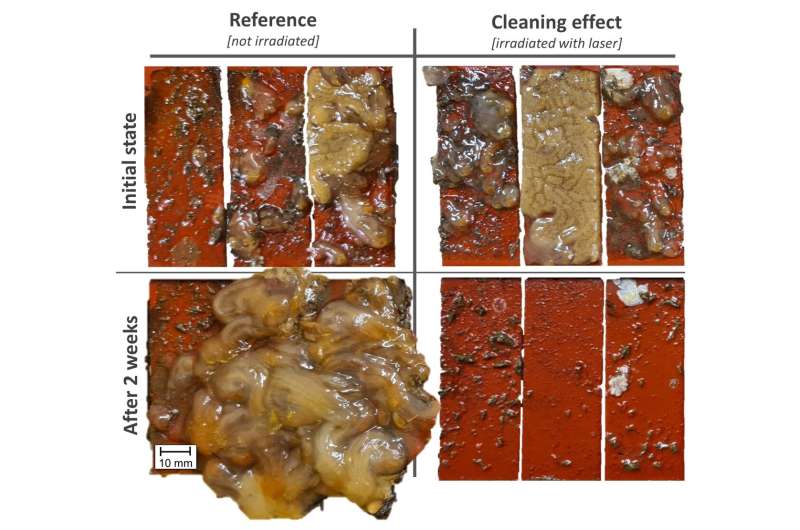This article has been reviewed according to Science X's editorial process and policies. Editors have highlighted the following attributes while ensuring the content's credibility:
fact-checked
proofread
Eco-friendly underwater cleaning of ship hulls

Biofouling is the growth of algae, mussels, and other marine organisms on the hull of a ship. The fouling increases the flow resistance of the ship—and thus increases fuel consumption and CO2 emissions. Mechanical cleaning can damage the hull coating. In addition, the biofouling must be extracted to keep organisms or even parts of the ship's coating from getting into the water.
Scientists from the LZH, together with Laserline GmbH and the Fraunhofer Institute for Manufacturing Technology and Applied Materials Research IFAM, have now developed an environmentally friendly and efficient solution to the problem of biofouling.
Eco-friendly cleaning with the laser underwater
Laser radiation can be used to lethally damage marine biofouling underwater without damaging the underlying coating of the ship's hull. The LZH scientists have developed a process in which the cells of the organisms are damaged by laser radiation in such a way that they die and are then simply washed away by the water after some time.
The researchers conducted their investigations in the south harbor of the island of Helgoland. There, they irradiated biofouling samples with the laser, then returned them to the North Sea and checked them after two to four weeks. "We were able to achieve a clear, time-delayed cleaning effect," says underwater technology expert Dr.-Ing. Benjamin Emde from the LZH. "With simulated currents, as would be added in real life with a moving ship, the cleaning effect is further enhanced."
Reducing emissions and avoiding species displacement
Biofouling does not only affect fuel consumption and emissions levels. The organisms can lead to the introduction and spread of non-native species in foreign ecosystems. "Species displacement is a major risk of biofouling," Emde says. If a ship introduces foreign organisms into an ecosystem through hull fouling, it can severely disrupt the ecosystem.
In practice, this leads to ships being banned from docking in foreign ports, as has happened again recently with cruise ships, for example. Here, as well, cleaning with the laser is a good alternative to mechanical methods: Because the introduced biomass is lethally damaged during laser cleaning, it is no longer dangerous for foreign ecosystems afterward.















